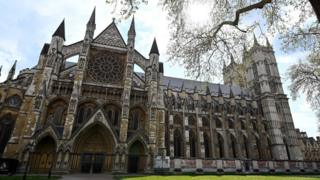 Image copyright
AFP
Image copyright
AFP
Westminster Abbey is holding a memorial service marking 80 years since the Battle of Britain, in the venue's first major event since lockdown.
The battle, fought entirely in the air, was a dramatic turning point in World War Two.
The abbey has held a service of thanksgiving on Battle of Britain Sunday every year since 1944.
This year's event has significantly lower attendance and social distancing in place.
Fewer than 100 guests are attending the service, which usually attracts about 2,000 people.
They include Prime Minister Boris Johnson, who is giving a reading at the service, Labour leader Sir Keir Starmer and Marshal of the Royal Air Force Lord Stirrup, representing the Prince of Wales.
Chief of the Air Staff, Air Chief Marshal Mike Wigston, is also giving a reading.
Guests are all wearing masks, with each chair placed two metres apart to allow social distancing, with protective plastic screens separating the north and south transepts of the abbey.
Image copyright PA Media Image caption The prime minister, arriving for the service on SundayA statement from the organisers said the service, which started at 11:00 BST on Sunday, would be "reduced in stature but not in spirit".
"The abbey is a very large church, it usually holds 2,200, so the guests will be easily spaced out to conform with social distancing," it said.
The last major service to take place at the venue was the Commonwealth Day service held on 9 March, two weeks before the UK went into lockdown in response to the coronavirus pandemic.
The service, which will remember the 1,497 pilots and aircrew who died, is being led by the Dean of Westminster Abbey, Dr David Hoyle.
Image copyright MOD Image caption A Texan T1 being flown to mark the 80th anniversaryAlthough the battle took place between July and October in 1940, 15 September is Battle of Britain Day - the date of a decisive victory by the RAF.
The RAF defended the skies over southern England, as Hitler's Luftwaffe flew daily attacks ahead of a planned invasion.
Some 1,120 Luftwaffe aircraft were sent to attack London, but were repelled by 630 RAF fighters - and two days later Hitler postponed his plans to invade Britain.
Commemorations have been limited this year due to coronavirus restrictions, but a variety of tributes took place across the UK, including special exhibitions from the Imperial War Museum.

 5 years ago
894
5 years ago
894 

